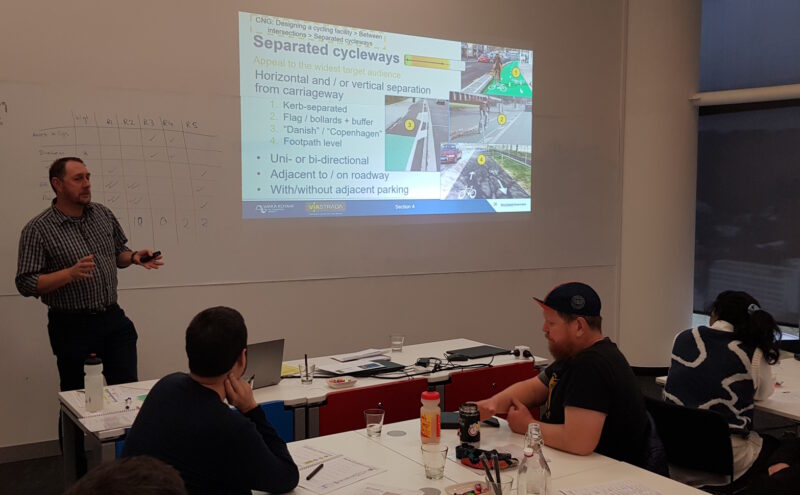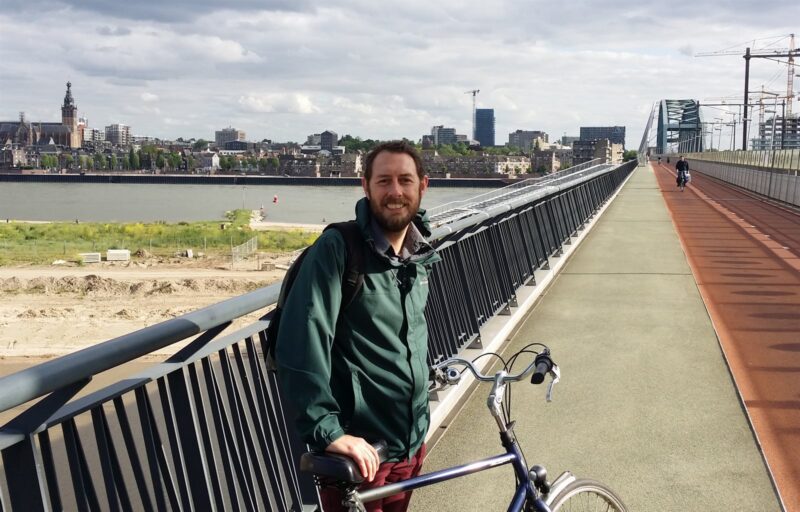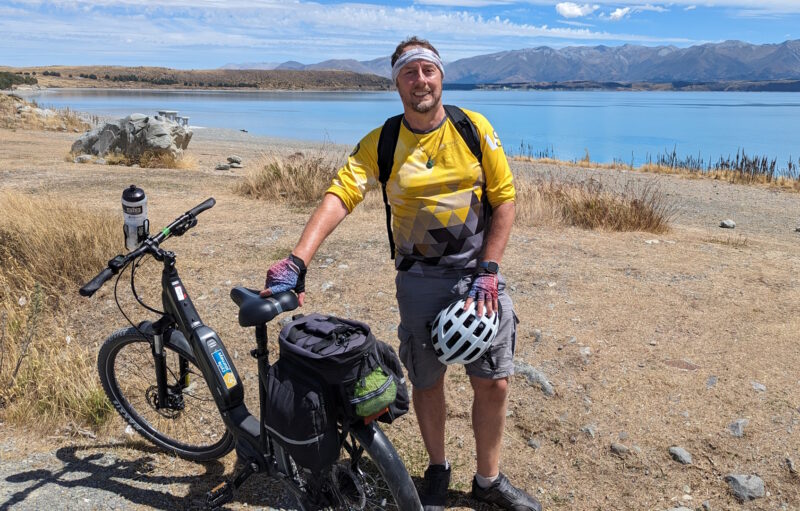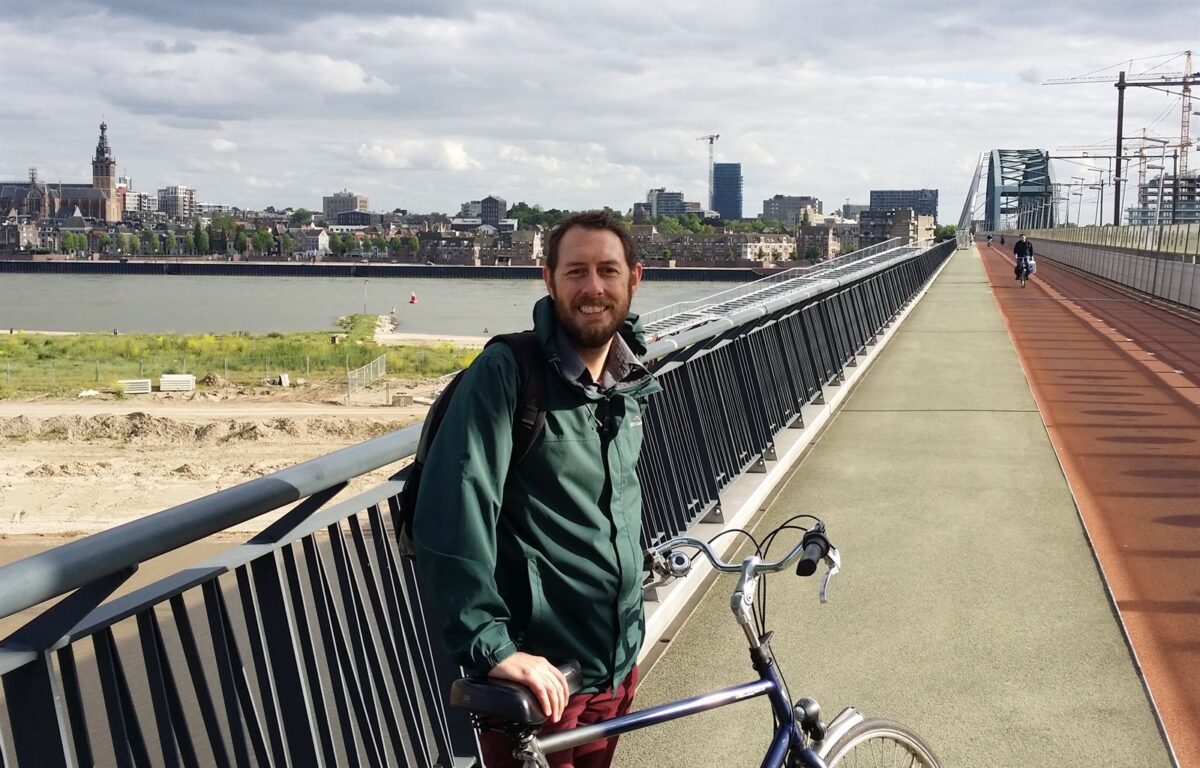In the coming months, I’d like to post a series of short pieces on people who are actively involved in making greater Christchurch a great place to cycle and encouraging everyday cycling. I’ve got a few ideas about who I might talk with, but let me know in the comments if there’s anyone (or a group) you’d like to know more about.
In the meantime, who better to start with than Cycling in Christchurch’s very own Glen Koorey (who actually received a Cycling Champion award in 2014 – you can check out Axel Downard-Wilke’s tribute here).

Glen’s professional role
Glen’s an engineer by training, with a PhD in transportation engineering (as well as masters and honours degrees in civil engineering, and a BSc in computer science). He’s taught and worked in the field for over 30 years and is currently Director – Principal Transportation Engineer & Transportation Planner at transportation consultancy ViaStrada.
ViaStrada’s work focuses on two main areas – road safety and sustainable transport – much of which relates to cycling. At the local level, this might involve preparing plans and designs for a cycleway or developing a district-wide walking and cycling strategy. Nationally, Glen does a lot of work on best practice guidelines. He is responsible for keeping Waka Kotahi’s Cycling Network Guidance up to date and has recently prepared new design guidance for rural cycling and for cycling on hills and gradients. His ongoing work on speed management around New Zealand also contributes to the safety of cycling.
Glen delivers a lot of training on planning and design for cycling, something he started when he was a traffic engineering researcher with Opus and continued as a lecturer at the University of Canterbury. Courses are attended by a mix of consultants, council staff, Waka Kotahi employees and cycle advocates. He says making some lower-cost course places available for advocacy groups helps ensure people are informed when they are making submissions. He estimates he and his fellow course instructors have trained 1500-2000 people over the past 20 years.

Glen’s previous role at the University of Canterbury allowed him to travel overseas and see different cycling facilities elsewhere (best-practice or otherwise), and in 2015 he had a three-month study tour to Europe. He says this has certainly influenced his understanding of what works or not for cycling.

Glen still maintains a connection with the universities, guest lecturing at the engineering schools at Auckland and Canterbury universities. And sometimes he’ll be asked to mark a student’s thesis.
On top of all that, Glen regularly presents at national and international conferences, has been involved in various specialist panels and committees, and is often asked for expert comment on cycling and road safety issues by the media. He’s become somewhat of a ‘go-to’ person.
Late last year, Glen was made a Fellow by Engineering New Zealand in recognition of his experience and contribution to best practice in the transportation industry, as well as his contribution to the community.
When asked what achievements he is most proud of, Glen points to his involvement on the national 2014 Cycling Safety Panel, set up in the wake of a coronial inquiry on a series of cycling fatalities. He says the panel was a real focal point for getting national attention about what needed to be done. The panel made 35 recommendations for change, many of which have now been implemented.
In 2015, Glen was also appointed to the committee that assessed urban cycleway projects after government funding was made available as a result of the Cycling Safety Panel’s work.
Advocacy and community service
Glen’s professional expertise aligns well with his work advocating for a better environment for everyday cycling and encouraging others to give cycling a go. Because he knows what he’s talking about, people listen.
Glen has been actively involved in local and national cycle advocacy groups in the past. He was on the Cycling Action Network (CAN)’s national committee for ten years, with a period as Co-Chair, as well as being a member of Spokes Canterbury’s core group (again, taking on the role of Chair for a while). While he has stepped back from active committee involvement, he still keeps his ear to the ground and is asked for advice from time to time.
Biketober is one achievement that stands out for Glen during his time at Spokes Canterbury. This month-long festival of cycling every October is all about having fun on a bicycle, and was initially set up in 2017 to coincide with a cycling conference in the city. Glen was integral to getting it started and it’s now a regular fixture on Christchurch’s events calendar (thanks to Robert Fleming and now Michelle Hollis having picked up the mantle).
Glen has been running the Cycling in Christchurch website for ten years. Regular readers will know that Glen often posts a couple of times a week, freely sharing his expertise and thoughts on all things cycling, which is no small commitment. He enjoys doing it, and says about 2,000 people follow the site, but he would certainly welcome more contributions!
Glen the cyclist
Glen is a regular cyclist himself. He cycles to work and makes other short trips and recreational rides around the city when it is convenient (for example, to the beach for Kite Day). He’s not into road cycling and does very little mountain biking, despite his fellow directors’ preference for holding work retreats in popular mountain biking spots.
He has cycled only a few of New Zealand’s Great Rides so far and describes the West Coast Wilderness Trail as the ideal trail to start with. More recently, he cycled the Alps 2 Ocean Cycle Trail (complete with helicopter ride) and found the open vistas and majestic views of that trail a contrast to the quiet bush setting of the West Coast.

While Glen has been cycling for years, his partner only recently started commuting to work – prompted by lack of parking at her workplace. Glen says two things helped making cycling a viable option for her: getting an electric bike and being able to use the city’s new cycleways. Now, her confidence has grown to the point where she will happily use the painted cycle lanes as well.
Glen says the money put into cycleway infrastructure after the Canterbury earthquakes has been a game-changer for Christchurch. There’s now a greater mix of people cycling – more women, more families, more kids on bikes – and getting around by bike is starting to feel more mainstream. He’s also highly complimentary of work done in Wellington in the last few years to roll out transitional cycleways that are relatively low-cost and quick to implement.
Glen’s tips for getting started
If you’re thinking about making more trips by bike, here’s some advice from Glen:
- Make sure you do your homework on the best way to get where you want to go. That won’t always be the same way you would drive there.
- If you’re completely new to cycling, be prepared to feel uncomfortable for the first few rides as your body gets used to the saddle. You will get a sore butt, but it will get better.
- Related to this, make sure your seat is high enough, so you aren’t cycling with your knees up around your elbows. You also need to be able to touch the ground with your feet – so you’ll need to get the balance right.
- Don’t hug parked cars when you are riding. If you can touch a vehicle as you pass by, you’re too close. You might be concerned about being too far out in the road – but the car parked next to you is far more dangerous than the one travelling behind you.
- You might want to invest in panniers instead of a backpack. That will save you from getting a sweaty back while you’re cycling.
And remember, there are lots more tips and resources on the Cycling in Christchurch website.


Thanks Glen for all you have done and continue to do for the cycling community in particular and the whole community in general. While it is not an original thought I note that each cyclist on the road is generally one less driver (and yes one less vehicle). Win-win